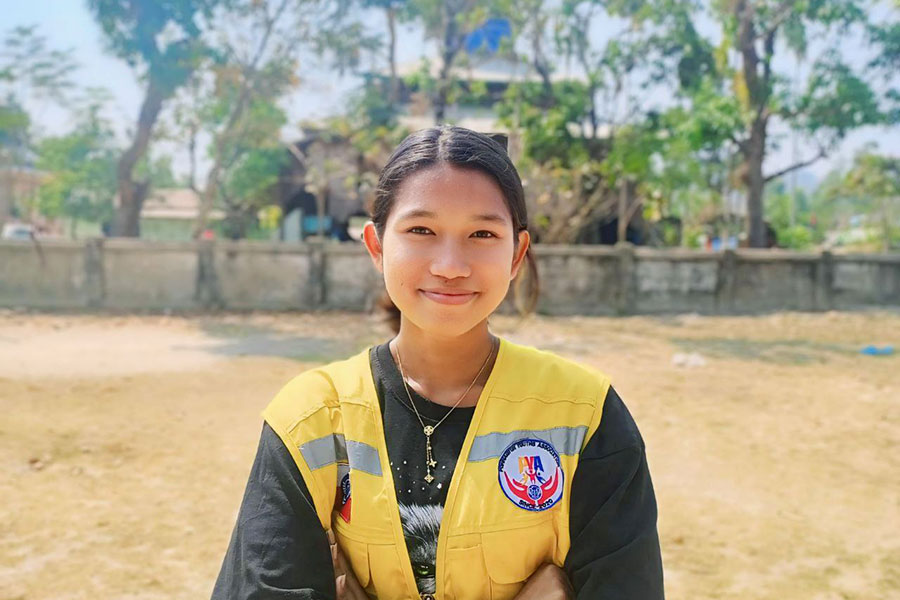- IDPs in Kyauktaw struggle with collapsing shelters amid aid shortages
- Travel restrictions deny Arakanese youth access to higher education
- Motorists fined K30,000 for traffic violations in AA controlled areas
- Inmates escape from Kyaukphyu Prison amid heightened security
- Arakan farmers struggle as paddy market collapses, debts mount
Interview: Vice chair of Ponnagyun Youths Association discusses plight of IDPs
Some IDP families are going hungry due to food shortages. Some IDPs collect cash donations in villages to buy food.
01 Apr 2024

DMG Newsroom
1 April 2024, Sittwe
The United Nations Office for the Coordination of Humanitarian Affairs (UNOCHA) has warned that the need for humanitarian aid for more than 300,000 IDPs in Arakan State, who have fled their homes due to military conflict, has never been more dire.
There are more than 30,000 people in Ponnagyun Township, near the Arakan State capital Sittwe, who have fled their homes due to the fighting. Many IDPs are living in makeshift tents made of thatch on the side of the road and at the foot of the mountains.
As IDPs suffer from food shortages and lack of even basic assistance from humanitarian aid organisations amid skyrocketing commodity prices, DMG interviewed Ma Hnin Thazin Hlaing, vice chairwoman of the Ponnagyun Youths Association (PYA), regarding the situation for IDPs on the ground.
DMG: What are the most urgent current needs of IDPs?
IDPs are currently in urgent need of food, sanitary pads for women, nutritious foods for children, vaccines for pregnant women and tarpaulin sheets to be used in the rainy season.
DMG: What is the status of assistance for IDPs? Are IDPs receiving assistance?
IDPs receive assistance from some civil society organisations in Arakan State, but they don’t receive assistance on a regular basis. Some NGOs and INGOs that provided relief supplies to IDPs in the past have halted operations since the latest fighting in Arakan State.
There are two relief groups providing assistance to the IDPs on the ground. But IDPs have many needs and assistance from them is not enough. Some IDPs do not receive assistance at all.
DMG: How do IDPs address their livelihood issues?
The number of IDPs is increasing, but the amount of relief items for IDPs is decreasing. Some IDP families are going hungry due to food shortages. Some IDPs collect cash donations in villages to buy food.
DMG: In the past few days, there have been strong winds and rain. Can you tell me about the difficulties this has presented for IDPs?
There are over 30,000 IDPs in Ponnagyun Township. Most IDPs live in makeshift tents beside the motor road. There are IDPs living in a mosquito net in the bush so that they don’t get bitten by mosquitoes.
In this situation, it was very difficult for them when it rained. The IDPs had no place to cook, no place to sleep, and had to move from place to place. The little rations they got were all wet from the rain, so they couldn’t eat. As for the mothers of the children, they had to flee and take shelter in the jungle, and it was very difficult. Everything is a challenge for them.
DMG: The Ponnagyun Youths Association (PYA) is reportedly launching a campaign to raise funds to provide tarpaulin sheets to the IDPs. Tell us more about that.
The motivation behind this campaign is to provide tarpaulin sheets to the owners of the destroyed houses in Ponnagyun during this recovery period. We cannot buy timber and nipa palm leaves during this time. We mainly intend to provide tarpaulin sheets to those in Yeyoepyin and Khamaungtaw villages, where hundreds of homes were torched by junta troops.
We will also donate tarpaulin sheets to some people in Pauktaw and Minbya townships. But at present, it is not as possible as we thought because there are still few people who support us. So we still need a lot of donors at home and abroad.
DMG: Is there anything else you would like to add about IDP issues?
IDPs do not know exactly when they will return home. Therefore, the first thing to do is to ensure the long-term stability of IDPs. IDPs face various difficulties such as losing their homes and being away from their children. For IDPs, the need for assistance is highest. It would be better if we could get tarpaulin sheets for the IDPs ahead of the rainy season to build makeshift tents. Otherwise, it may become very difficult for IDPs during the rainy season.






.jpg)













